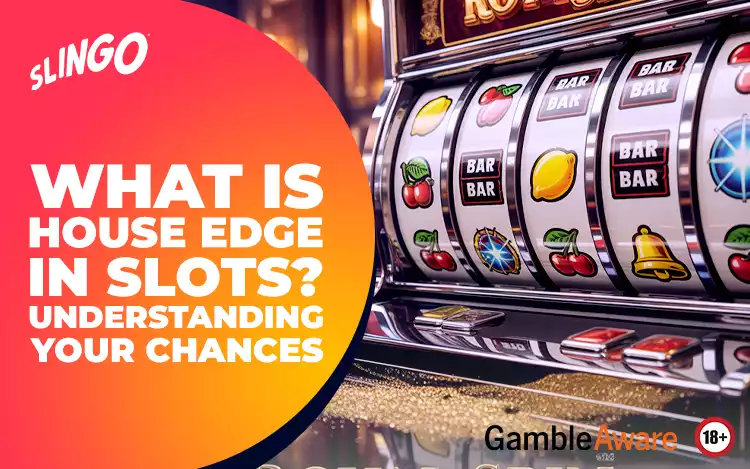Once you start playing slots online there’s a good chance that sooner, not later, you’ll bump into the term “house edge.” This might sound like something odd or exotic for the uninitiated, but it’s actually a very simple concept - it’s essentially how a casino makes a profit. Ever heard how the house always wins? The house edge is the key to this, and it’s important to understand if you’re going to play online slots or any other casino games.
We’ll say this straight, understanding how the house edge works won’t help make you a better player, or improve your chances in any way. After all, slots are games of chance, and there's nothing you can do to affect the results of your spins. But knowledge of the house edge will help you play smarter, as you’ll know what your chances truly are and how much you can theoretically expect to be returned over time. Ready to know more about this interesting topic? Then let’s get cracking!
*Terms and conditions apply.*
What is the House Edge?
Like we mentioned above, the house edge is a simple concept since it’s the average percentage of a player’s bet, regardless of size, that goes straight to the casino. All casino games have a built-in house edge, be they roulette, blackjack, or slots, and this value can vary wildly between games. For instance the average house edge of slots varies at around 4-5%, while the classic Baccarat has a very low house edge of 1.06% or 1.24% depending on the bet you’re placing.
Once you understand that the house edge is a percentage it’s pretty easy to calculate how much you stand to potentially get back while playing. If you wager £100 on a slot with a house edge 4% then the casino will get £4 while you’re set to get £96 via payouts.
Something important to keep in mind is that the house edge is theoretical, with its value calculated of tens or even hundreds of thousands of spins and game sessions. At the end of the day slots are purely random, and results can vary wildly between spins. As such, the house edge should only be used as an indicator of results over long play sessions and not how much you stand to win from a couple of spins.
What is the Return to Player (RTP)?
Another term you might have seen as a slot fan is Return to Player, or slot RTP. You might wonder if this has anything to do with the house edge, and you’ll be right. You see, the RTP is simply the inverse of the house edge! As the name suggests, RTP refers to how much a player stands to get back over a long period of time. Thus, if a slot has an RTP of 96% then you’ll theoretically get back 96% of your wagers while the casino gets a house edge of 4%.
Like we mentioned above, the RTP of a slot is calculated by the game’s creator over hundreds of thousands of spins. The value itself is theoretical and the actual results of a spin are, ultimately, down to pure chance. However RTP is a good way to find out which slots are generally worth playing. The average RTP of online slots is 96%, and as such we’ll always recommend you playing slots with an RTP of 96% or higher are generally considered more player-friendly.
How to Find the RTP of a Slot
Here’s some good news for online casino players - it’s very easy to find the RTP of most online slots. Simply check the game’s About or Help section and the RTP should be clearly listed together with all of the game's other details, such as the maximum win and the volatility or variance. If the game does not actually list its RTP then your best bet is to search for reviews on trusted sites or the provider’s website.
The situation is different when it comes to playing at brick and mortar casinos, as the slot machines available there are not obliged to provide RTP data. In addition identical machines may be set with varying RTPs. As a rule higher denomination machines tend to have better RTPs compared to penny or low-stakes slots, but if you want full transparency then online slots are the way to go.
Why Does the House Edge Exist?
The house edge is essential for a casino, whether it’s online or on the high street, to operate. After all, the casino needs to cover the costs of games, not to mention employees and bills for necessities. As such it’s the built-in profit margin that’s necessary for any business to continue operating, and is the equivalent of a shop marking up prices or a bookie adding a small margin to odds. Of course with gambling there’s always a chance that someone gets lucky and wins the jackpot, but the mathematics behind the house edge generally ensure that the house always wins.
How to Use the House Edge to Make Smarter Game Choices
The house edge is not a means to change the outcome of a game’s spins – there’s nothing you can do about that. What it can help with is with smarter game choices. Always check the RTP of the games you plan to play then follow our recommendations:
1. Go for High RTP Games
Here’s a simple rule of thumb - the higher the RTP of a slot, the better. This is due to the house edge being lower and, as a result, the potential of getting back more from the game is higher. The average RTP of online slots stands at 96%, so always go for slot games with high RTP.
2. Keep Volatility in Mind
While the RTP shows how much the game pays back on average, it’s the volatility that tells how the game actually pays out. Also known as variance, volatility represents the risk involved when playing a slot, and can be classified as low, high, or medium. Low volatility games are, well, low risk, typically associated with smaller, more frequent returns. High volatility games are the opposite, with lots of losing spins that can lead to potentially bigger wins. Medium volatility, as one might expect, promises a balance between the two extremes.
3. Manage your Bankroll
Always set a budget for playing slots, and stick to it. Make smaller bets so that your bankroll lasts longer, and remember that slots should be played for fun, not to make a profit. Enjoy the excitement the spins bring without thinking about what you can win if the symbols land in the right place.
Smart Play Means More Slot Fun!
While it might sound unfair, the house edge is the way a casino can keep on running. Any business needs to make a profit if it’s to continue providing a service, after all. Understanding how the house edge works can help you make better decisions when playing, especially once combined with knowledge of volatility and the other factors that make a slot.
Ultimately slots are games of chance, and the outcome of each spin is purely random. So always play for fun, not to get a profit. Understand the house edge, choose games with volatility that matches your tastes, and stay fully in control by sticking to your bankroll! Have fun playing slots and, as always, play responsibly.









